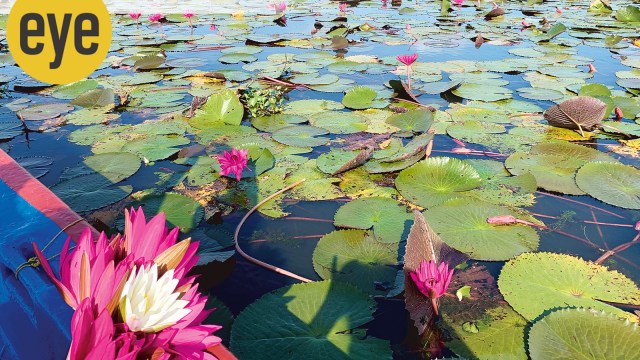In Kerala’s Malarikkal, a sea of pink water lilies turns paddy fields into paradise
Between July and October, the backwaters of Malarikkal get covered with thousands of pink blooms, transforming it into Kerala’s most Instagrammable destination
 Ever since Malarikkal’s discovery, experiential and eco-friendly tourist circuits have been picking up around the pink lily farms (Photo: Rinku Ghosh)
Ever since Malarikkal’s discovery, experiential and eco-friendly tourist circuits have been picking up around the pink lily farms (Photo: Rinku Ghosh)
Who would have thought that a boatman could convince me to do what I had never done in my life — pose with a bouquet of pink water lilies on the bow of a country boat, squinting under the 6 am sun in the middle of a lake in full bloom, referencing a battered print of an old Raja Ravi Varma painting. “Don’t look straight into the camera, look the other way, tilt your head, sit in an angle, splash up the water with your hands and let the drops sit on the bouquet… they will catch the sun,” says Chetta, with the ease of an ace lensman. For, like the fluttering bouquet I held in my hands, he had convinced me that hope could float in the sea of water lilies around me. That one could be a goddess of that smallest moment in time, even smile silly.
At Malarikkal village in the backwaters of Kottayam, thousands and thousands of pink water lilies wake up with the sun, fanning their petals out in the morning breeze, their glistening leaves carpeting the water all the way to the horizon. The lilies nod their acceptance of the morning visitors, bobbing up and down towards the boat. In fact, they are the biggest ensemble act, crowding around you for collective attention, sometimes at eye level. You just cannot stop at one.
The lake is nothing but 650 acres of paddy farms that flood with the monsoon after the season’s harvest. Chetta himself is a paddy farmer, who makes good with his boat during tourist season. The flowers bloom in July, last till October and vanish before the next sowing season.
On another boat, a book lover precariously leans over the hull, almost plunging Arundhati Roy’s The God of Small Things in between the lilies. “The book is about her growing up in these parts. So I had to come here and take a photo with the cover. See how they blend beautifully,” she says. Roy grew up in Aymanam village, which she fictionalised in her debut book and is not too far away from Malarikkal, where canals run through coconut groves and past thatched homes.
Far away, a couple does a pre-wedding shoot in all their finery, the crew with the gear on one boat, the photographer in the other. They want to wrap up their shoot before the pink lilies curl up into a tight bud by 10 am, just before the sun gets torturous. In fact, it was one such shoot posted by an Instagrammer that made Malarikkal a most-wanted spot for FOMO hunters. Families from Kottayam laze away their Sunday morning on a boat, daughters giving selfie tips to their shy mother, their father shadowing himself under an umbrella and trailing a finger in the water, recreating a bit of his childhood.
 Expect to pay a nominal fee of approximately INR 200 – INR 300 per person for a ride (Photo: Rinku Ghosh)
Expect to pay a nominal fee of approximately INR 200 – INR 300 per person for a ride (Photo: Rinku Ghosh)
Far away from humans, a lone egret rests its slender legs on the saucer-like emerald leaves, probing its beak between two lilies, tapping into the rhizomes under water till the current just takes it away to a new pod.
As the horizon seems a brighter shade of pink, Chetta canoes through the thickest rows of lilies, so clustered that you wouldn’t know there is water underneath. He stops the motor and uses oars to make a way without damaging the flowers. “Peace lives here, who are we to shatter the stillness? Listen and you can hear the flowers whisper,” says Chetta, gesturing to the more multilayered blooms that happily grow into each other.
Malarikkal has not always been a tourist destination. The farmers have been co-existing with the water lilies through every monsoon, and as they disappear with the water drying up, they return to growing paddy. One of them chanced upon Rupesh Kumar K, CEO of the Kerala Responsible Tourism Mission. “I belong to these parts myself but never knew about the lilies till a farmer told me that such a natural wonder could not be found anywhere around the Vembanad lake. I had never seen so many water lilies stacked together. I took a photograph and posted it on Facebook five years ago. Then we engaged the farming community and formed collectives who got the boats. The farmers become boatmen in the off season. Now the houses bordering the fields earn Rs 50,000 to one lakh a month from the parking fee of tour buses,” says Kumar, who started the pink lily festival in these parts last year.
The village panchayat has earned close to Rs 5 crore in less than five months. Chetta’s boat ride fares have helped him set up a tea shop that his wife runs on the banks every morning. Many like him have either bought a parking spot, built toilet facilities or set up photo booths for young couples for their save-the-date photoshoots. For deeper memories, women self-help groups extract natural dyes from the flowers for textiles while the flowers themselves are used in herbal products.
Ever since Malarikkal’s discovery, Kumar and his team have been developing experiential and eco-friendly tourist circuits around the area. Visitors can take a houseboat cruise, participate in traditional agricultural activities such as rice planting and harvesting. They can even try their hand at coconut harvesting by climbing the tall trees, go out fishing with cast nets, learn coir-making and prepare authentic meals with fresh, locally sourced ingredients, be it rice, fish and spices.
The pink lilies remind you of the ephemerality of life. They also remind you why life has to be a burst of colours while it lasts. And as you mirror yourself in the dark leaf that the undertow dragged in with the boat, you know you will be back.
- 01
- 02
- 03
- 04
- 05































